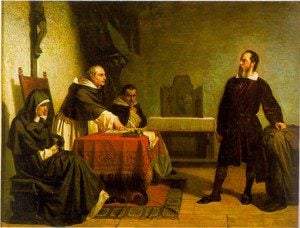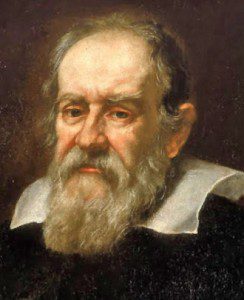
If one were to argue that the Church’s fallout with Galileo was one of science vs. religion, one would also need to argue that it was about science vs. science, biblical interpretation vs. biblical interpretation, and politics as well as personalities. In fact, one would be hard pressed back in Galileo’s day to separate religion, science, and politics. They were often intertwined.
Further to my recent post on Copernican thought,[1] the following quotation puts forth several of the issues surrounding Galileo’s controversy succinctly:
It is true of course that in the seventeenth century the arch-Copernican Galileo Galilei (1564-1642) met opposition from Catholic authorities in Rome. However, their dispute focused on matters related to biblical interpretation, educational jurisdiction, and the threat Galileo represented to the entrenched “scientific” authority of Aristotle, not on any supposed Copernican depreciation of the cosmic specialness or privilege of humankind. If anything, Galileo and his fellow Copernicans were raising the status of earth and its inhabitants within the universe.[2]
As to science vs. science, the Ptolemaic and Aristotelian cosmology that placed the earth at the center of the universe dominated the medieval era; its origins were pagan, not biblical. However, the Catholic Church valued Aristotelian thought to a great extent. “Because the Catholic Church had a heavy investment in Aristotelian philosophy, the conflict was not a simple one between ‘science’ and ‘religion’. It was rather between new science and the science sanctified by previous generations.”[3] Copernicus and Galileo challenged the geocentric cosmology, and therefore Ptolemy and Aristotle, just as Francis Bacon challenged Aristotle for his metaphysical framework coupled with his deductive method; for Bacon, induction would help to free science from dogmatic, philosophical impositions that discount empirical investigation.[4]
As to biblical interpretation, Galileo’s apparent moves to interpret Scripture independently of ecclesial supervision suggested to some church authorities embroiled in controversies and unrest involving the Reformation that Galileo had Protestant ‘heretical’ sensibilities. Such apparent inclinations, if left unchallenged, would only lead to further unrest and upheaval, weakening the Catholic Church internally and its relations with the state. The Catholic Church sensed the need to reassert itself and secure its authoritative office involving the rightful interpretation of Scripture.[5]

Lastly, we come to personalities. Galileo’s mutual respect and friendship with Pope Urban VIII soured as a result of miscommunication.[6] In addition, Galileo’s overwhelming confidence, assertive posture in the affair and acerbic rhetorical style may have hurt his popularity and favor in certain circles.
In all these things, it is very difficult to frame the affair as religion vs. science. The moral of the story is that as the account of Galileo involving religion and science is a complex matter, it should be treated as such. No doubt, the same could be said of a host of other developments in history involving the relationship of faith and science.
Why then the oversimplifications in the Galileo affair? Beyond such problems as a lack of awareness or knowledge of this complicated account, a simplistic treatment of tensions in the relationship can serve as a weapon for various personal and political agendas. Those who manipulate the historical terms of debate for their own agendas win the debate and much more. However, such unscholarly and inappropriate historiographical warfare is neither pious nor scientific. In fact, it harms the reception of science and faith respectively as agents of the common good. As a result, this or that group may win a pyrrhic battle, but we all lose out in the end.
_______________
[1]See my Patheos post titled, “What is man that you are mindful of him…?” How the Copernican Revolution Promoted Human Value.”
[2]Dennis R. Danielson, “Myth 6: That Copernicanism Demoted Humans from the Center of the Cosmos,” in Galileo Goes to Jail: And Other Myths About Science and Religion, ed. Ronald Numbers (Cambridge, MA: Harvard University Press, 2009), p. 52.
[3]John Brooke and Geoffrey Cantor, “The Contemporary Relevance of the Galileo Affair,” in Reconstructing Nature: the Engagement of Science and Religion, Glasgow Gifford Lectures (Oxford: Oxford University Press, 2000), p. 111. It should be noted that the Catholic Church was not and is not a monolithic tradition; there were various points of view and competing agendas at the time regarding Galileo’s Copernican claims; complex political tensions and interpersonal conflicts evolved and exploded, eventually resulting in Galileo’s demise. See pages 112-113.
[4]Francis Bacon, “First Book of Aphorisms,” in The Age of Reason: The 17th Century Philosophers, ed. Stuart Hampshire, The Mentor Philosophers (New York: Meridian Classic, 1956), pp. 27-28.
[5]See Reconstructing Nature, pages 118-119.
[6]See Reconstructing Nature, pages 109-111.












